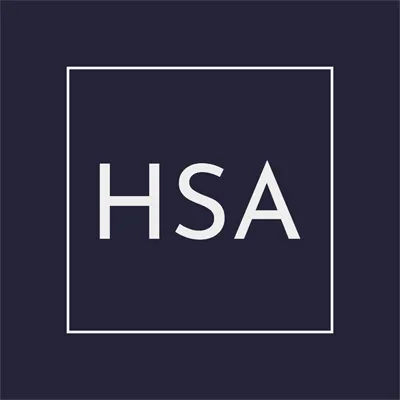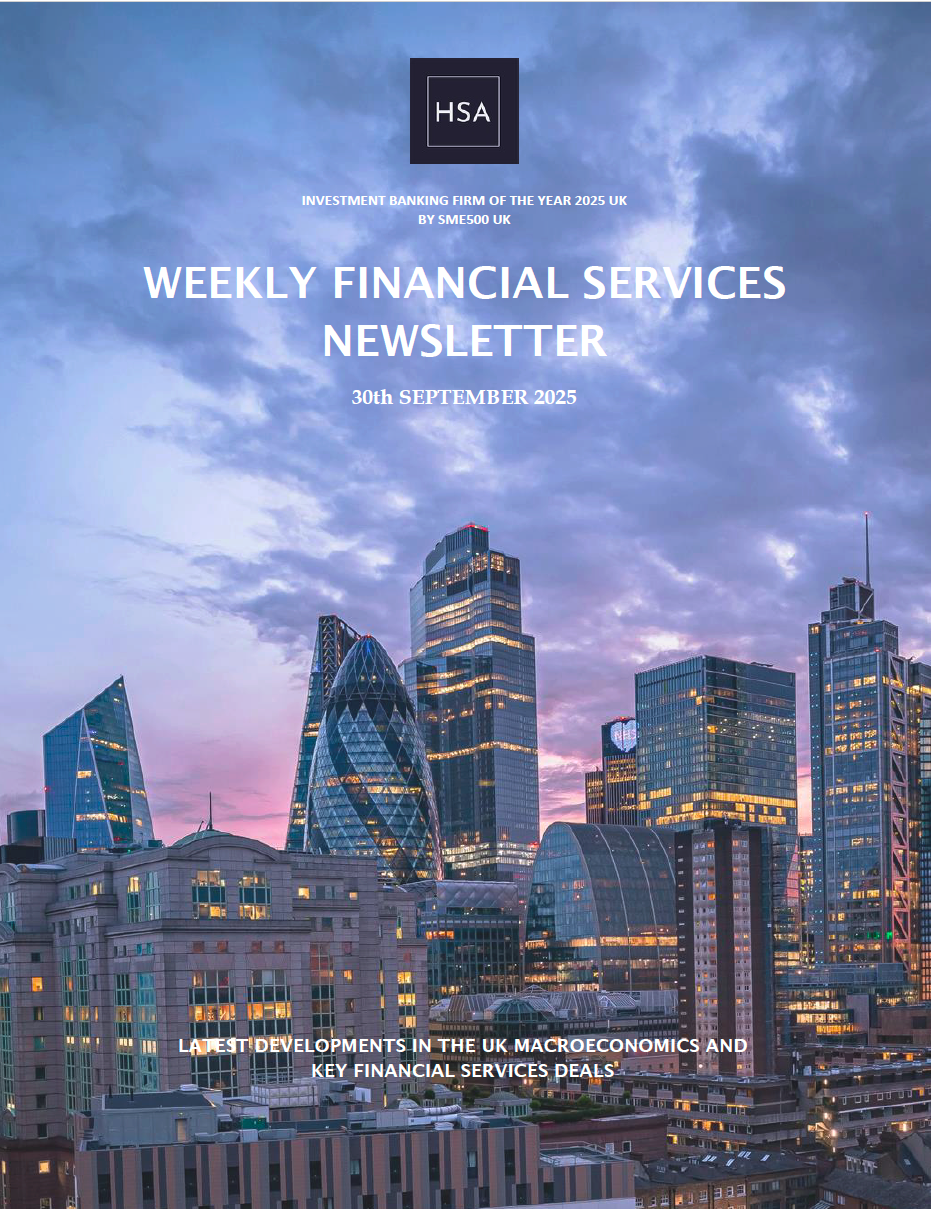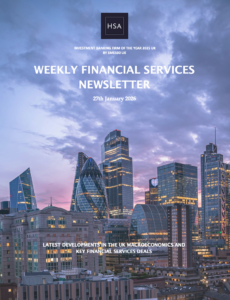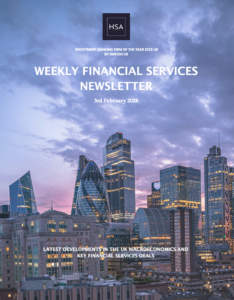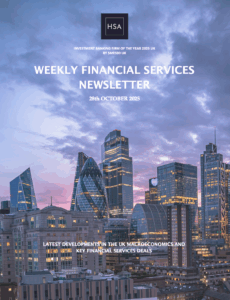Key Points from the Week: Chancellor Rachel Reeves doubled down on fiscal credibility, signalling possible tax rises and spending cuts in November, while the Bank of England held rates at 4% with a cautiously dovish tone. The OECD projected UK inflation at 3.5% in 2025, the highest in the G7, compounding concerns over sluggish growth and weak productivity. At the same time, UK car output plunged amid JLR’s cyberattack, but financial services deal flow remained robust, led by Revolut’s £3bn pledge, Zopa’s acquisition of Rvvup, and Lloyds’ reported move for Curve.
Welcome to HSA Advisory‘s Financial Services Newsletter, your comprehensive guide to the latest developments in the UK macroeconomics and key financial services deals. Sign up here to get the newsletter sent to your inbox every Tuesday. Get in touch with our Founder & Managing Director of HSA Advisory directly at himanshu.singh@hsa-advisory.co.uk
UK Macroeconomics
29 September 2025: Rachel Reeves Defends Fiscal Rules and Signals Tough Budget Choices
– Reeves ruled out reckless borrowing, citing the 2022 Truss mini-budget as a cautionary tale. With a potential £30B fiscal gap, she pledged stability to preserve market confidence ahead of the November Budget
– Global shocks, wars and U.S. tariffs, worsened the UK’s outlook, keeping inflation high and growth weak. Reeves reiterated no rises in income tax, NICs, or VAT rates but hinted at alternative levies
– Speculation points to VAT base expansion (e.g., services like taxis) instead of rate hikes. Businesses warned added taxes plus prior NIC increases could depress hiring and deepen economic slowdown
– Reeves pledged youth job guarantees, EU mobility talks, and public service investment, framing “securonomics” as optimism against Reform UK’s populism. Investors remain cautious on fiscal credibility if OBR forecasts downgrade productivity assumptions
29 September 2025: FTSE Enjoys Uplift on London Listing Sentiment
– FTSE 100 rose 0.56% (51pts to 9,336) as optimism over London listings offset U.S. fiscal uncertainty. Gains came despite mixed global data, including a first Chinese profit rebound in four months
– AstraZeneca pledged London HQ and listing, while adding NYSE shares. Stock rose 1.2% (£111.32), boosting UK market confidence after a wave of delistings and foreign moves by Flutter, Ashtead, and Just Eat
– Revolut considering dual London–New York listing provided further sentiment lift. The move contrasts with recent IPO droughts, reinforcing London’s appeal as a financial hub amid concerns over shrinking listings base
– GSK jumped 3.4% (£15.36) after CEO Emma Walmsley announced January departure, replaced by CCO Luke Miels. Market focus turns to GSK’s obesity drug gap and HIV patent expirations under new leadership
29 September 2025: Business warns Labour against fresh tax burden
– UK business leaders warned ministers at Labour’s annual conference they cannot bear more tax hikes after last year’s budget delivered the largest increases in three decades, damaging the party’s “pro-business” reputation
– Chancellor Rachel Reeves has not ruled out further rises to plug a £30bn deficit, leaving companies anxious ahead of the November 26 budget. Executives say rhetoric alone will not restore confidence without concrete pro-growth action
– Labour ministers sought to rebuild ties, revamping business events to offer more face time with firms. While feedback was more positive than last year, leaders stressed credibility hinges on tax and spending decisions, not engagement
– The London Chamber of Commerce urged against new burdens on SMEs, saying uncertainty is stifling investment. The CBI also raised concerns over a proposed workers’ rights bill that could raise hiring costs
29 September 2025: BoE’s Ramsden signals disinflation confidence as labour weakens
– Deputy Governor Dave Ramsden said wage growth is normalising and the labour market loosening, supporting the UK’s “core disinflation process.” He expects inflation to return to target under current restrictive policy settings, aligning with gradual easing expectations.
– The Bank Rate remains at 4%, with seven MPC members voting for a hold and two preferring a 25bps cut. Ramsden suggested scope exists for further rate reductions as inflationary pressures ease and growth softens.
– Inflation is expected to peak near 4% in September, higher than the BoE’s 2% target, but Ramsden stressed confidence in falling prices. Household inflation expectations remain elevated, a potential risk for medium-term anchoring
– While Ramsden leans dovish, Governor Andrew Bailey and other MPC members urged caution, with Megan Greene warning inflation may prove more persistent than forecast. The BoE maintains a careful, data-driven stance on policy restraint removal
28 September 2025: Revolut Weighs $75bn Dual Listing in New York and London
– Revolut eyes $75B (£56B) IPO, potentially the first dual listing in NY and FTSE 100. Valuation would rank it among London’s top 15 firms, revitalising UK’s IPO-starved market
– UK listing reforms now allow FTSE 100 entry in five days, boosting index-fund access. Revolut’s IPO would enable early shareholder exits while reinforcing government pledges to make Britain “the best place to do business.”
– Storonsky, once dismissive of London’s 0.5% stamp duty, now signals openness after UK reforms. Commitment tied to new Canary Wharf HQ; Reeves highlighted policy changes to attract high-growth listings
– IPO timing remains uncertain; Revolut prioritises UK bank launch and global expansion to 100M users. Secondary sales already value firm at $75B, signalling investor appetite despite market volatility
27 September 2025: London Considers Lowering Affordable Homes Target
– GLA reviewing the 35% affordable housing rule to speed planning approvals. Developers argue viability requires 10–15% thresholds. Only 3,950 homes built in H1 2025, far short of Labour’s 88,000 annual London target
– Labour pledged 1.5M homes this parliament, but approvals in Q1 2025 were at a 13-year low. Reduced thresholds seen as vital to unlock stalled projects amid cost inflation and regulatory delays
– Mayor Khan and Housing Secretary Steve Reed in talks to accelerate delivery. Industry welcomes flexibility but warns planning bottlenecks and the Building Safety Regulator backlog also constrain housing supply alongside affordability requirements
– Ministers unveiled plans for 12 new towns, starting with Tempsford (Beds), Leeds South Bank, and Crews Hill (London). Public-private capital will be mobilised, echoing post-WW2 housing drives, though timelines may span decades
26 September 2025: FCA Issues Warning on Unregulated Loan Notes and Mini-Bonds
– FCA flagged risks from unlisted loan notes/mini-bonds, often tied to property, citing 20,000 complaints and 2,000+ warnings in 2024. Many issuers exploit legal exemptions, leaving investors outside protection schemes like FSCS
– Regulator urged use of the FCA Register before investing, warning finfluencers and slick marketing campaigns are luring retail savers. High default risks mean many investors recover little to nothing on failed schemes
– Loopholes include self-certifying as a “sophisticated investor”, enabling firms to bypass authorisation. FCA cautioned investors to realistically assess experience before taking on elevated risks pitched as safe income products
– The warning followed the acquittal of Wellesley & Co, where hundreds lost savings despite years-long investigation. The case highlights regulatory gaps and dangers of unregulated property-linked investments in the UK
25 September 2025: BCC Warns Businesses Cannot Shoulder Workforce Health Crisis Costs
– 300,000 workers exit annually due to health limits; sickness absence at a 10-year high. BCC argues SMEs already hit by NI and wage hikes cannot bear further occupational health costs
– Only 30% of BCC members offer occupational health. CIPD survey highlights record sickness absence, while rising youth inactivity tied to mental health worsens long-term labour market scarring and productivity drag
– Government scrapped a £5B welfare cut plan; Mayfield review (Oct 2025) to propose reforms. He noted incentives favour replacing sick staff over investing in recovery, worsening inactivity pressures.
– BCC calls for tax breaks, sick pay rebates, and wage subsidies for 16–24s with health conditions. Proposes bulk-buy occupational health access and levy-funded manager mental health training to ease SME cost burdens
24 September 2025: UK Signals Willingness to Pay More for Medicines to End Pharma Feud
– Science minister Lord Vallance said “all options” are on the table, including reforming the QALY pricing measure. Pharma groups argue outdated metrics undervalue drugs; recent clawback taxes triggered AstraZeneca, Merck, and Lilly investment pullbacks
– Vallance confirmed UK–US talks on drug tariffs and pricing, as Trump pressures pharma to cut U.S. costs using cheaper overseas benchmarks. Industry seeks integrated solutions to avoid tariffs and restore global competitiveness
– Moderna opened a new Oxford vaccine plant (capacity 250M doses annually) under a 10-year, £1B UK R&D deal. CEO Bancel said QALY reform could unlock savings by preventing hospitalisation costs via reimbursed drugs
– The government launched a new £50M Life Sciences Transformational Fund to attract capital-intensive projects (≥£100M). Policy shift aims to rebuild pharma confidence, with Vallance stressing the NHS must get “best medicines quickly” via updated pricing
23 September 2025: BoE Chief Economist Warns QT Shift Risks Gilt Turbulence
– Huw Pill opposed slowing quantitative tightening to £70B from £100B, warning it offers only temporary relief. He argued QT is not the driver of gilt volatility; structural debt and demand shifts are
– UK gilt yields hit decades-highs after global bond sell-off. Pill cautioned against treating QT as a “first defence,” saying it risks masking fiscal pressures and undermining other market-stability tools
– BoE gilt holdings peaked at £875B in 2022, now steadily shrinking. Pill noted waning demand from DB pension schemes and rising government issuance are pushing long rates higher
– Pill urged sticking to a gradual QT path while relying on the 4% policy rate for flexibility. Blurred responsibilities risk central bank independence and accountability in fiscal-monetary coordination
23 September 2025: OECD projects UK to lead G7 inflation
– The OECD forecast UK inflation at 3.5% in 2025, the highest in the G7, driven by higher payroll taxes, a minimum wage hike, and regulated price increases. Inflation stood at 3.8% in August, well above the 2% target
– Growth is expected at 1.4% in 2025, the second-fastest in the G7 after the US. But UK expansion will slow to 1% in 2026, lagging peers, amid productivity weakness and deteriorating public finances
– The OECD warned Labour’s November budget may require tax hikes to close a £20–30bn fiscal gap. Chancellor Reeves pledged stability, but critics argue last year’s employer NIC increases and wage rises worsened inflationary pressures
– Despite sticky prices, the OECD sees scope for two BoE rate cuts next year, reducing Bank Rate to 3.5%. But households’ high inflation expectations and surging food and energy costs risk slowing disinflation progress
23 September 2025: UK Business Activity Growth Undershoots Expectations
– PMI fell to 51 in Sept, a 4-month low vs 53.5 prior and 53 forecast. Weak overseas trade, job losses, and looming tax rises drove sentiment down
– Firms flagged hiring freezes and margin pressure, cutting private sector employment. Exports dropped at the steepest pace since April, with weak client confidence adding to subdued demand outlook
– Economists cite a £20B fiscal gap for the Nov Budget. Noise from surging borrowing costs and IMF bailout talk likely exaggerated gloom in the PMI survey
– OECD forecasts UK growth 1.4% (2025), 1% (2026) with inflation at 3.5%, G7’s highest. Factory inflation cooled, but services inflation stayed firm, offering mixed signals for BoE rate path
UK Financial Services Key Transactions
29 September 2025: Revolut Pledges £3bn UK Investment and 1,000 Jobs
– Revolut committed £3B UK investment (2025–2030), adding 1,000 jobs via its new Canary Wharf HQ. With 65M global customers (12M UK), it targets 100M by mid-2027, anchored by £10B global plan, $1B B2B revenue, and expansions across LATAM, APAC, Africa, and Europe
29 September 2025: US Insurer that Recently Launched UK Subsidiary to be Acquired
– DB Insurance of Korea will acquire 100% of Fortegra from Tiptree and Warburg Pincus in an all-cash deal. Fortegra, with a newly approved UK subsidiary (Dec 2024), expands DB’s footprint into the $1.6T US P&C market
29 September 2025: Zopa Acquires Rvvup to Expand Retail Finance Offering
– UK digital bank Zopa acquired payments platform Rvvup (founded 2020, ex-PayPal GM David Nunn). Terms undisclosed. Deal strengthens Zopa’s embedded payments strategy, enabling merchants to unify card + Pay by Bank rails. Integration expected to cut processing costs, boost conversions, and deliver AI-driven checkout insights within 6 months
25 September 2025: Zilo Raises £20m Series A2 to Scale Transfer Agency Platform
– Zilo secured £20M Series A2 at an uplifted valuation vs. £25M Series A (Jan 2024). Backed by Portage and State Street, funding supports expansion into new markets and AI tools. With Fidelity and State Street as clients, Zilo positions for M&A-driven legacy system replacement in asset/wealth management
25 September 2025: Goldman’s Petershill Partners to Delist with $921m Capital Return
– Goldman-owned Petershill Partners will delist after shares fell 34% since 2021 IPO, despite portfolio growing 17% annually. A $921M cash return (35% premium) highlights persistent listed PE trust discounts to NAV
25 September 2025: Lloyds Reportedly to Acquire Curve for £120m
– Lloyds is set to buy fintech Curve for ~£120M, below its 2023 £133M Series C valuation. Investor IDC (12% stake) opposes the deal, but Lloyds seeks digital wallet control and payments data synergies against Apple/Google Pay dominance
24 September 2025: TRIVER Secures up to £114m to Revolutionise SME Cash Flow Finance
– TRIVER closed £114M (£14M equity, £100M debt capacity) led by AlleyCorp and HSBC Innovation Banking. With 1,500 clients, 17,000 invoices (£180M) funded to date, it targets £1B annual SME financing, leveraging AI + Open Banking to undercut banks’ 4-week processing with 10-minute approvals
24 September 2025: LADbible Founder Backs InsurTech Veridox with £1m
– Manchester-based Veridox raised £1M led by Outward VC, with LADbible CEO Solly Solomou investing. Its AI fraud-detection tool flagged £50K fraud in seconds during a pilot with a $3B insurer; insurance fraud costs Europe €13B annually
24 September 2025: Fnality Secures $136m to Expand Tokenized Settlement Network
– Fnality raised $136M Series C from BofA, Citi, Temasek, Goldman Sachs, and others to scale its tokenized settlement systems beyond sterling (£FnPS). Funding supports cross-currency expansion, liquidity optimization, and real-time settlement, positioning Fnality as critical infrastructure for tokenized M&A flows
24 September 2025: Elliptic Secures Strategic Investment from HSBC
– Elliptic became the first blockchain analytics firm backed by four G-SIBs (HSBC, JPMorgan, Santander, Wells Fargo). HSBC’s stake follows Elliptic’s record Q2 growth, 99.99% uptime, and launch of Issuer Due Diligence for stablecoin risk, positioning it as critical compliance infrastructure for M&A in digital assets
24 September 2025: Risk and Reputation Firm Signal AI Bags $165m Funding Round
– Signal AI raised $165M led by Battery Ventures, taking a majority stake. Serving 650+ enterprise clients (Diageo, Uber, Volvo), its AI platform analyses billions of data points to flag emerging risks; funds will fuel global expansion and acquisitions
24 September 2025: PredictAP Raises $5m to Expand AI Real Estate Automation
– PredictAP secured $5M from RET Ventures and Wise Ventures to scale AI-powered AP automation for real estate. Its system processes 4M+ invoices annually, cutting processing time from 11 to 3 days across 100+ customers
22 September 2025: TPG Backs Tide in $120m Round, Valuing UK Fintech at $1.5bn
– Tide raised $120M led by TPG with Apax participation, lifting valuation from $650M (2021) to $1.5B. Serving 1.6M SMEs across four markets, Tide will fund AI, new products, and European expansion
A Word from Our Founder & Managing Director
“This week reinforces the central theme shaping UK markets: fiscal credibility. Chancellor Reeves’ commitment to discipline reflects lessons from 2022 and highlights the delicate balance between growth, stability, and political expectations. Investors remain cautious, but financial services activity tells a different story. Deal flow is robust, with fintech, payments, and digital infrastructure continuing to attract capital and strategic interest despite broader economic headwinds. At HSA Advisory, we believe volatility presents opportunities for well-prepared investors and businesses. Our mission is to provide the clarity and strategic guidance needed to navigate these shifts. We would be delighted to connect if you are exploring advisory support, M&A opportunities, or sector insights.”
Himanshu Singh, Founder & Managing Director
Pulse Check
With Chancellor Rachel Reeves signalling tax rises and spending cuts to close a £30bn fiscal gap, fiscal credibility is firmly under the spotlight. Yet with businesses warning against further burdens, inflation forecast to remain the highest in the G7, and UK car production plunging on the back of JLR’s cyberattack, the outlook looks increasingly fragile. The question is: can fiscal restraint and selective growth investments restore market confidence, or will the economy be dragged into a slower, more fractured recovery?
We’d love to hear your thoughts.
Source: Financial Times, Reuters, The Times, Insurance Times, Insurance Business UK, The Guardian, Insurance Age, CityWire, FinTech Global
Stay informed with our weekly updates on the UK’s financial landscape, providing you with the insights needed to navigate the evolving economic environment
Full report here: 20250930 HSA Financial Services Newsletter
